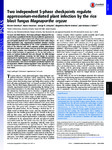Two independent S-phase checkpoints regulate appressorium-mediated plant infection by the rice blast fungus Magnaporthe oryzae

Date
2017-01-10Author
Subject
Metadata
Show full item recordAbstract
<jats:title>Significance</jats:title> <jats:p>Rice blast is a devastating fungal disease of cultivated rice, and its control is vital to ensure global food security. In an effort to understand how the rice blast fungus causes disease, we have investigated how the cell cycle controls the early stages of plant infection. The rice blast fungus develops a special cell, called an appressorium, to infect rice leaves. This structure generates enormous pressure, which the fungus applies as physical force to puncture the leaf surface. We have shown that a buildup of pressure in the appressorium is necessary to trigger an unusual cell-cycle checkpoint that is necessary for the appressorium to function properly. If this process is blocked, rice blast disease cannot occur.</jats:p>
Collections
Publisher
Place of Publication
Journal
Volume
Issue
Pagination
Recommended, similar items
The following license files are associated with this item:

